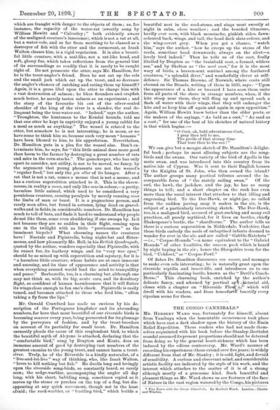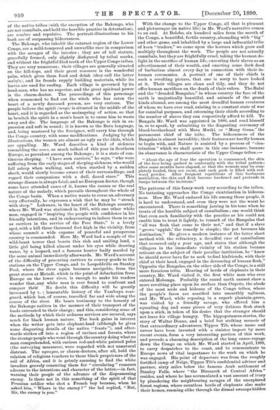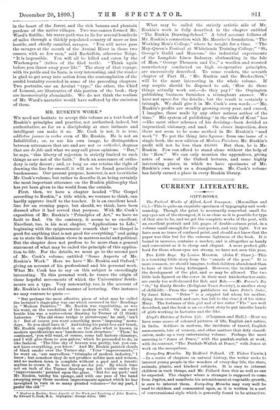THE CONGO CANNIBALS.*
MR. HERBERT WARD was, fortunately for himself, absent from Yambuya when the lamentable occurrences took place which have cast a dark shadow upon the history of the Emin Relief Expedition. Those readers who had not made them- selves acquainted with his book before the Stanley-Barttclot scandal assumed its present proportions should not be deterred from doing so by the general heart-sickness which has been induced by the odious controversy. Mr. Ward's manner of recording his experiences (these extend over five years) is widely different from that of Mr. Stanley ; it is cold, light, and devoid of sensibility. A curious and observant mind, and considerable artistic facility are indicated by the style of his work, and the interest which attaches to the matter of it is of a strong although mostly of a gruesome kind. Such beautiful and pleasant things as Mr. Ward shows us are features of the face of Nature in the vast region watered by the Congo, his pictures • Five Years with the Congo Cannibals. By Herbert Ward. London; Matt* and Window
of the native tribes (with the exception of the Bakongo, who are not cannibals, and hold the horrible practice in detestation), are sombre and repulsive. The portrait-illustrations to his book are of surpassing hideousness.
The Bakongo, who inhabit the cataract region of the Lower Congo, are a mild-tempered and unwarlike race in comparison with the savages of the interior ; they are of tall stature, gracefully formed, only slightly disfigured by tribal marks, and without the frightful filed teeth of the Upper Congo tribes. They are very numerous ; their villages are generally situated on the hill-tops, and their great resource is the wonderful palm, which gives them food and drink (they call the latter malafu), and its fronds supply building materials, while its leaves are used for roofing. Each village is governed by its head-man, who has no superior, and the great spiritual power is the charm-doctor. The proceedings of this personage when summoned to find out the witch who has eaten the heart of a newly deceased person, are very curious. The people believe the spirit (moyo) is situated in the middle of the heart, and it is regarded as the mainspring of action, so that to bewitch the spirit in a man's heart is to cause him to waste away and die. The language of the Bakongo is rich in ex- pression and soft in sound ; it is known as the Batu language, and, being mastered by the foreigner, will carry him through the Congo country, with some modifications. Judging by the illustrations, the women are almost as ugly as the idols, which are appalling. Mr. Ward describes a kind of sickness resembling the nova, so much talked of this year in Southern Europe, as prevalent among the Bakongo ; it is a state of con- tinuous sleeping. " I have seen carriers," he says, " who were suffering from the early stages of sleeping-sickness, who would fall asleep when walking, and, when startled by a sudden shock, would slowly become aware of their surroundings, and regard their companions with a dull, dazed stare." This strange disease is always fatal; and no European doctor, though some have attended cases of it, knows the causes or the real nature of the malady, which prevails throughout the whole of the Congo basin. When a native wants to curse an adversary very effectually, he expresses a wish that he may be " struck with sleep." Lukunzu, in the heart of the Bakongo country, where Mr. Ward was stationed in 1885, with one other white man, engaged in " inspiring the people with confidence in his friendly intentions, and in endeavouring to induce them to act as carriers in the service of the Free State," is a lovely spot, with a hill three thousand feet high in the vicinity, from whose summit a wide expanse of peaceful and prosperous country is commanded. Here Mr. Ward had a sample of the wild-beast terror that besets this rich and smiling land, a little girl being killed almost under his eyes while drawing water, by a leopard, and a famous hunter badly mauled by the same animal immediately afterwards. Mr. Ward's account of the difficulty of procuring carriers to convey goods to the stations on the Upper Congo, and to Leopoldville on Stanley Pool, where the river again becomes navigable, from the great stores at Matadi, which is the point of debarkation from Europe on the lower river, is enough to make his readers wonder that ,any white man is ever found to confront and conquer thelP No doubt this difficulty will be greatly increased by t._ 1 lamentable history of the Yambuya rear- guard, which has, of course, travelled far and wide along the course of the river. He bears testimony to the honesty of the Bakongo natives in the manner of their transport of the loads entrusted to their charge ; and this, considering some of the methods by which their arduous services are secured, says much for black human nature. The book gains in interest when the writer gets into elephant-land (although he gives some disgusting details of the native " feasts "), and after- wards strikes off into a region of ravines and forests, where the Strange people who went through the country doing what no man comprehended, with curious red-and-white painted poles (the surveying measures), were regarded with not unnatural distrust. The ugangas, or charm-doctors, after all, bold the relation of religious teachers to these black proprietors of the soil of Africa, and it is grimly amusing to find the white invaders gravely, censuring them for " circulating " rumours adverse to the intentions and character of the latter,—in fact, warning their people of the advance of the dispossessing enemy. Is there not in this something of the spirit of that Prussian soldier who shot a French boy because, when he asked him, " Where is the enemy P " the lad replied, " But, Sir, the enemy is you."
With the change to the Upper Congo, all that is pleasant and picturesque (in native life) in Mr. Ward's narrative comes to an end. At Bolobo, six hundred miles from the mouth of the Congo, a beautiful, fertile country, abounding with " big " and other game, and inhabited by a large and influential tribe of keen "traders," we come upon the horrors which grow and multiply throughout the work. The people are not actually cannibals, but they are frightfully cruel, taking the keenest de- light in the sacrifice of human life, executing their slaves as an advertisement of their wealth, and enacting some dark deed of barbarism almost every day in connection with their in- human ceremonies. A portrait of one of their chiefs is such a revolting picture, that one is sorry to have looked at it. Their villages are clean and tidy, and they do not offer human sacrifices on the death of their rulers. The Balni and the "dreaded Bangalas," in whose country the face of the earth is majestically beautiful, and animals of the grand kinds abound, are among the most dreadful human creatures of whom we have ever read, existing in a constant state of war for cannibal purposes, and esteeming their chiefs according to the number of slaves they can respectively afford to kill. To Bangala Mr. Ward was appointed in 1886, and read himself in, so to speak, by submitting to the disgusting ceremony of blood-brotherhood with Mata Mwiki, or " Many Guns," the paramount chief of the tribe. The hideousness of the Bangalas is almost incredible; their features are hardly human to begin with, and Nature is assisted by a process of " cica- trisation " which we shall quote in this one instance, because its observance is characteristic of the Upper Congo tribes :—
" About the age of four the operation is commenced, the skin of the face being gashed in conformity with the tribal pattern ; after some months have elapsed, so that the wounds may be com- pletely healed, they are recut, and each gash is filled with red- wood powder. After frequent repetitions of this barbarous mutilation, the skin and flesh become hardened and protrude in lumps between the incisions."
The patterns of this fancy-work vary according to the tribes. No tattooing approaches the Congo cicatrisation in hideous-
ness. How Mr. Ward endured his life among those people, it is hard to understand, and even they were not the worst he encountered. There is something jarring in his tone when he treats of the horrible subject of cannibalism ; one would think that even such familiarity with the practice as his could not enable him to treat it lightly, to remark of the Bangalas that " all was flesh that came to their net," and that if a slave " grows uppish,' the remedy is simple ; the pot becomes his destination," He gives a modern instance of the latter short method with the refractory, a dreadful case of cannibalism that occurred only a year ago, and states that although the villagers in the immediate vicinity of his station became reticent on the subject of their peculiar institution, he "knew he should never have far to seek to find his friends, with their chief at their head, engaged in the devouring of human flesh." Opposite the Bangalas, on the other side of the Congo, is a still more ferocious tribe. Hearing of herds of elephants in their country, Mr. Ward visited it, the first white man who ever entered Mobunga. Probably the round earth cannot show a more revolting place upon its surface than Oupoto, the abode of the most nude and hideous of the Congo tribes, where the people's faces are scarified into unearthly ugliness, and Mr. Ward, while reposing in a superb plantain-grove, was visited by a friendly savage, who offered him a squealing dog and some pieces of very dubious flesh stuck upon a stick, in token of his desire that the stranger should not leave his village hungry. The hippopotamus-stories, the story of Walter Deane, and a brief but striking memoir of that extraordinary adventurer, Tippoo Tib, whose name and career have been invested with a sinister import by more recent events, form a very interesting portion of this work, and precede a charming description of the long canoe-voyage down the Congo on which Mr. Ward started in April, 1888, to carry despatches to the coast, and to communicate to Europe news of vital importance to the work on which he was engaged. His point of departure was from the roughly fortified camp of Nzige, Tippoo Tib's confidential adviser and partner, sixty miles below the famous Arab settlement of Stanley Falls, where "the Bismarck of Central Africa" resides, and where he has accumulated a vast amount of ivory by plundering the neighbouring savages of the unexplored forest regions, where countless herds of elephants also make their homes, roaming alike through the dismal swamps hidden in the heart of the forest, and the rich banana and plantain gardens of the native villages. Two war-canoes formed Mr. Ward's flotilla ; his water-path was to lie for several hundreds of miles through a thickly populated country of more or less hostile, and chiefly cannibal, savages. "You will never pass the savages at the mouth of the Aruimi River in those two canoes, with so few men," said Rachidbin, otherwise Nzige. "It is impossible. You will all be killed and eaten by the Wachongera " (tribes of the filed teeth). " Think again before you throw away your life." The story of that voyage, with its perils and its feats, is very interesting, and the reader is glad to get away into action from the contemplation of the sordid brutality recorded in some of the preceding chapters. Two portraits, one an Aruimi " type," the other, the Chief of Lomani, are illustrative of this portion of the book ; they are inconceivably abominable. We do not think the realism of Mr. Ward's narrative would have suffered by the omission of them.












































 Previous page
Previous page